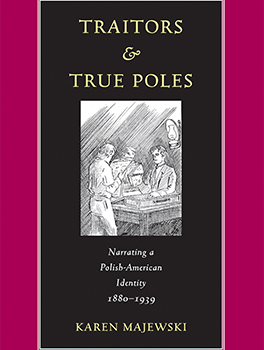Traitors and True Poles Illuminates the History of Immigrant Literature
"In our current moment, when various political actors have sensationalized migration crises for their own purposes, Majewski’s book is an essential reminder that the voices of immigrants have always shaped the story of the United States."

by Catherine Brist, PhD Candidate in English & Women’s and Gender Studies
To know the stories of immigrants, Karen Majewski writes, we must be willing to “hear them in their own language” (13).
In Traitors and True Poles: Narrating a Polish-American Identity 1880-1939, Majewski explores the history of Polish-language literature in the United States. Majewski’s study focuses on works written by Polish immigrants before WWII, much of it produced within the “Polonian” diasporic communities of the upper-Midwest. Majewski traces the uses of literature within these communities, explaining that reading for them “was not the solitary, individual act we think of today, but rather a shared activity that brought one into active communication with others” (7). The authors Majewski studies viewed literature as vitally important: not merely entertainment, their stories were also vehicles for familial connection, tools for maintaining tradition and identity, and avenues for protest and dissent.
Many of the books Majewski discusses have never been translated into English, a testament to the multilingual history of American writing. In his introduction, series editor John J. Bukowczyk notes with regret that Polish immigrant literature has often been ignored by scholars and critics. He writes, “Heavily peasant in composition, the Polish immigrants of the late nineteenth and early twentieth centuries often have been portrayed as an inarticulate, undifferentiated mass, silent and rough like the coal many of them dug in the mining towns of industrial America” (xi). Majewski pushes back against this mistaken portrayal, illustrating instead the many ways that Polish-Americans produced a distinctive literary and artistic culture. In our current moment, when various political actors have sensationalized migration crises for their own purposes, Majewski’s book is an essential reminder that the voices of immigrants have always shaped the story of the United States.
CEW+ is proud to have supported Karen Majewski with a Margaret Dow Towsley Scholarship in 1991. To donate to a CEW+ scholarship fund, contact Alicia Marting at [email protected] or visit the CEW+ giving page at cew.umich.edu/give.
You can learn more about Karen in her CEW+ Strength in the Midst of Change podcast episode here.
Traitors and True Poles: Narrating a Polish American Identity 1880-1939 by Karen Majewski. Athens, Ohio University Press, 2003. 242 pgs. $26.95 paperback.
Author Bio: Catherine Brist is a PhD Candidate in English & Women’s and Gender Studies at U-M, a 2022 Hopwood Award winner, and a writer for CEW+. Her dissertation research focuses on the reception of contemporary trauma narratives.

